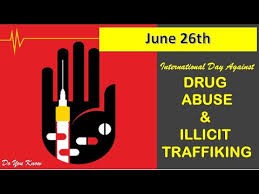International day against drug abuse and illicit trafficking

History of Drug AbuseAs drugs have been abused for hundreds of years all over the world, their effects have been felt for just as long.
As drugs have been abused for hundreds of years all over the world, their effects have been felt for just as long. Since drugs have been used, there were always those who abused them, which led to full-blown addiction and the bevy of side effects that come with it. As the physical and mental health implications of addiction became clearer, rehabilitation efforts began to appear. As a result, the history of rehabilitation in the United States dates back hundreds of years.
One of the Founding Fathers of America, Benjamin Rush, was one of the first to believe that alcoholism was not a matter of personal willpower but rather due to the alcohol itself. Rush challenged the accepted belief at the time that alcoholism was a moral failing, thereby progressing the concept of addiction as a disease. Per the University of Utah, in the past, addiction was treated as a criminal offense, with intensive faith-based prayer, or in mental institutions, but this signified a shift to viewing addiction as an illness that could be managed.
In 1864, the New York State Inebriate Asylum, the first hospital intended to solely treat alcoholism as a mental health condition, was founded. As the public began to view alcoholism and related drug abuse more seriously, more community groups and sober houses began appearing.
Today, thousands of drug abuse rehabilitation programs offer addicts a variety of treatment approaches, ranging from traditional, evidenced-based care to more experimental or holistic services. Since care should be customized according to the individual patient, oftentimes one’s treatment regime will consist of a range of therapies that have been chosen specifically for the individual.
Following Prohibition and the Twenty-first Amendment, which overturned Prohibition, a major step for the rehabilitation movement came in 1935, when Dr. Bob Smith and Bill Wilson – commonly known as Dr. Bob and Bill W. – founded Alcoholics Anonymous (AA). Using a spiritually based approach to rehabilitation, AA presented a welcoming environment where recovering alcoholics could find solace and support. From the AA format, various other branches formed, such as:
- Narcotics Anonymous (NA).
- Cocaine Anonymous (CA).
- Marijuana Anonymous (MA).
Today, thousands of drug abuse rehabilitation programs offer addicts a variety of treatment approaches, ranging from traditional, evidenced-based care to more experimental or holistic services. Since care should be customized according to the individual patient, oftentimes one’s treatment regime will consist of a range of therapies that have been chosen specifically for the individual.